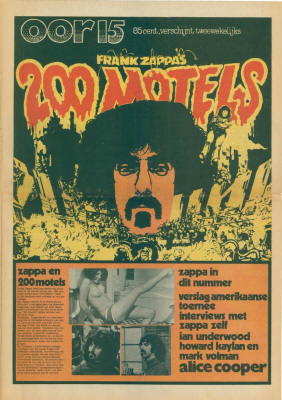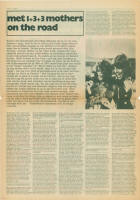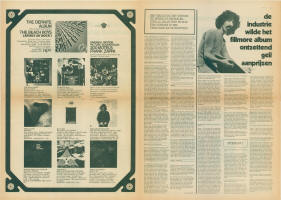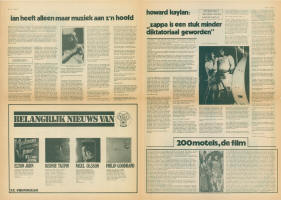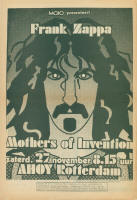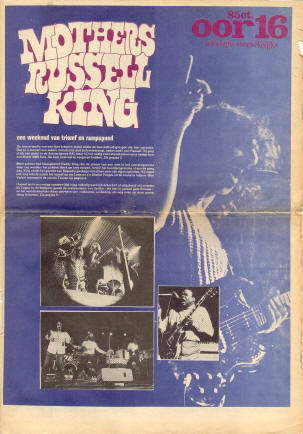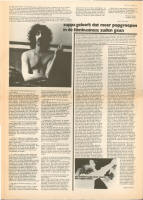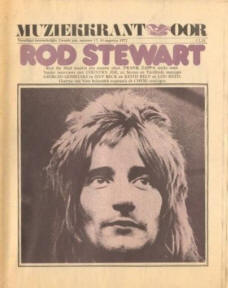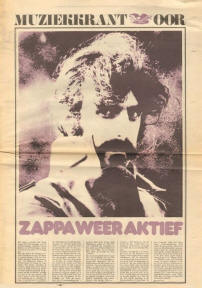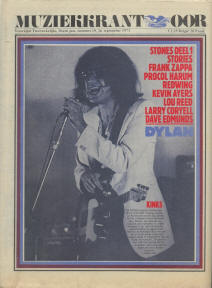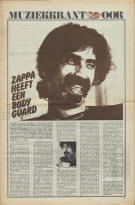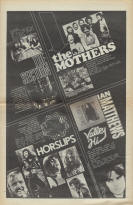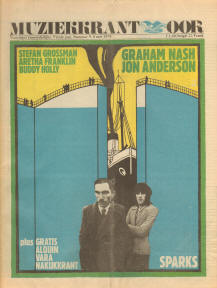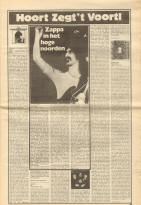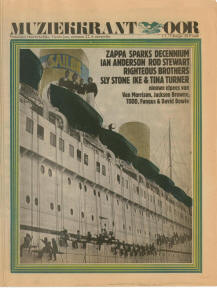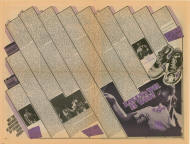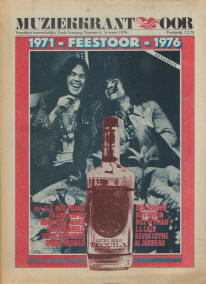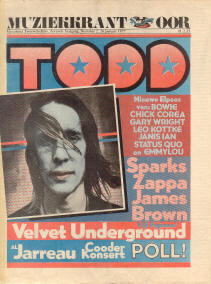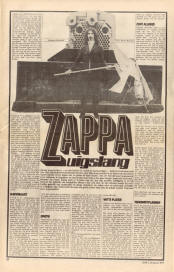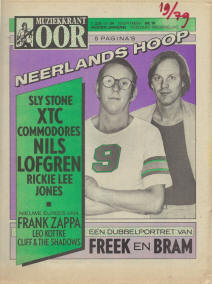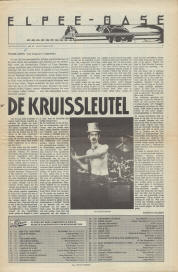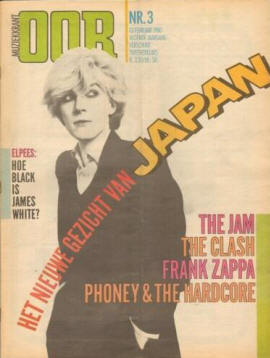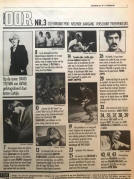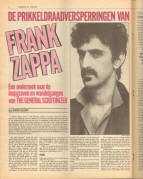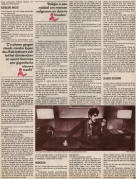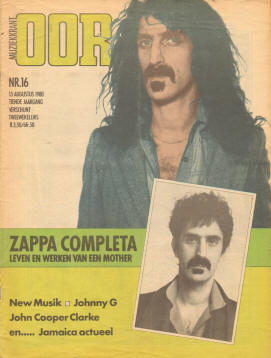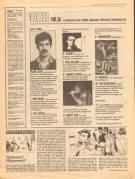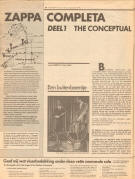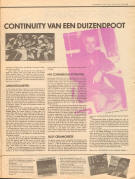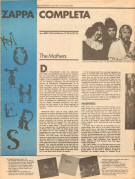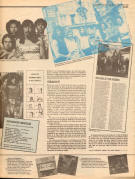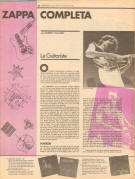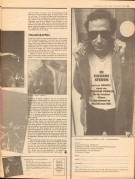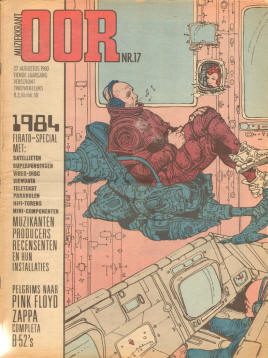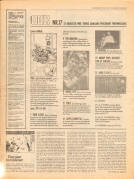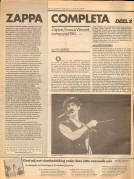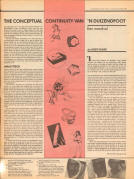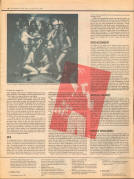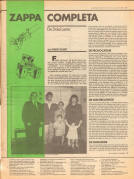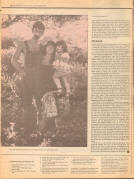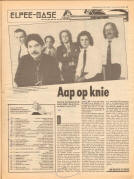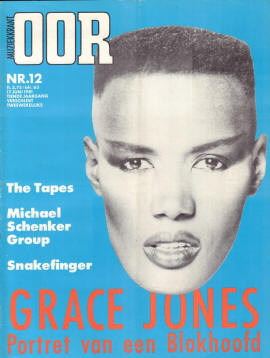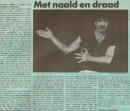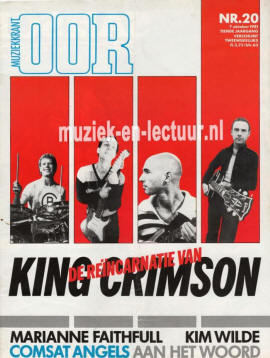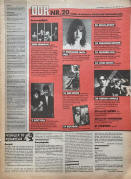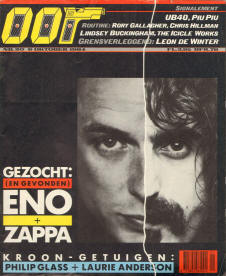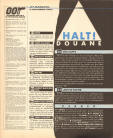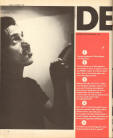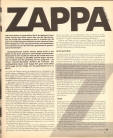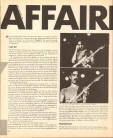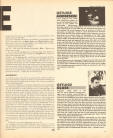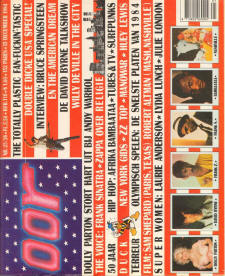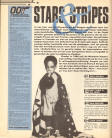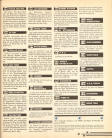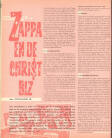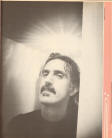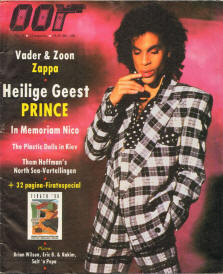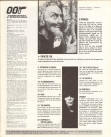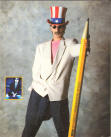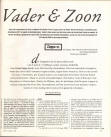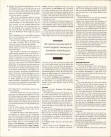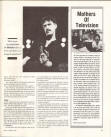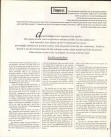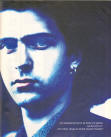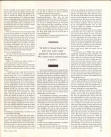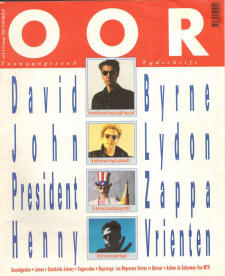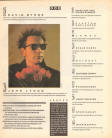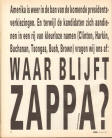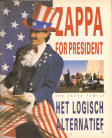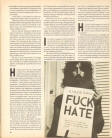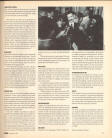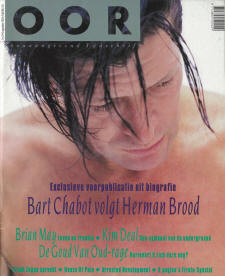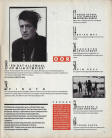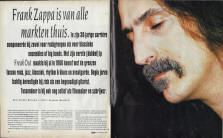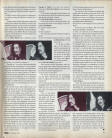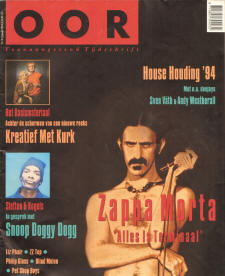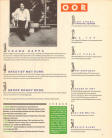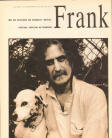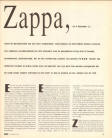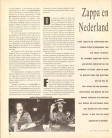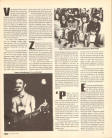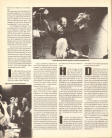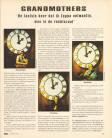OOR
1971
No. 15
Zappa en 200 motels
By ?, p 1
Met 1+3+3 Mothers On The
Road
By Jip Golsteijn, p 3
De industrie wilde het
Fillmore album ontzettend geil aanprijzen
Zappa interview by Jip Golsteijn, p 3
Ian heeft alleen maar
muziek aan z'n hoofd
Ian Underwood interview by Jip Golsteijn, p 4
Howar Kaylan: "Zappa is een stuk minder diktatoriaal geworden"
Mark Volman & Howard Kaylan interview by Jip Golsteijn,
p 5
200 Motels de film
By ?, 1 p 5
This is a real Zappa special issue containing nice cover, article about 1971 USA tour, interviews with Frank Zappa himself, Ian Underwood, Mark Volman and Howard Kaylan, articles about 200 Motels plus wonderful full page 27. November Ahoy, Rotterdam concert ad. Some of these articles are here available with full Dutch text and translation feature.
Source: slime.oofytv.set
1971 [December 9]
No. 16
Zappa gelooft dat meer
popgroepen in de filmbusiness zullen gaan
(Zappa believes more pop groups will get into the movie
business)
By Willem Hoos & Robert Briel, p 5
The Mothers zijn meer
waard dan Zappa alleen
(The Mothers are worth more than Zappa alone)
By Barend Toet, p 5
Automatic translation: Zappa remains a fascinating personality, although he lost some importance in recent years due to his accident and various artistic projects just before and after. Zappa has often stated that his life is an 'artistic project' he plans and in which everything has a purpose. After '200 motels' did not fit into this planned approach the follow-up that reality forced on him: a forced rest period of nine months and the premature dissolution of the Mothers edition with Howard Kaylan and Mark Volman. Without these two vocal clowns, Zappa has been looking for more instrumental forms ever since, took the Grand Wazoo orchestra on the road and is now touring with a new club Mothers, again an almost entirely instrumental company. After the performance a few weeks ago – underlining Zappa's considerable popularity in this country again – I had a conversation – my fourth over the years – with Zappa on these topics. (read more)
1974 November 6
No. 22
Zappa's Wil Is Wet! (Zappa's
Will Is Law!)
By Urban Gwerder, Canzus (translated by Ted Leyendekker),
pp 12-13
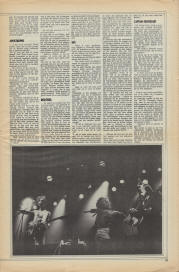
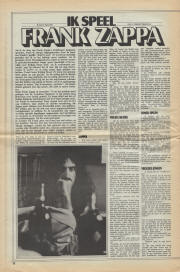 Automatic
translation: When I slowly open the door of Frank Zappa's hotel
room, I am abruptly stopped by Frank's 'gorilla' hand. Hold
it dude! It is made clear to me that I have to wait in the hall
until I am called. The shaven expert in various oriental combat
techniques asks almost kindly if I happen to work for Rolling
Stone. If I answer in the negative, he says with a laugh
that I can be happy about that, because otherwise I would have
been a few floors lower by now. Frank hates Rolling Stone.
(read more)
Automatic
translation: When I slowly open the door of Frank Zappa's hotel
room, I am abruptly stopped by Frank's 'gorilla' hand. Hold
it dude! It is made clear to me that I have to wait in the hall
until I am called. The shaven expert in various oriental combat
techniques asks almost kindly if I happen to work for Rolling
Stone. If I answer in the negative, he says with a laugh
that I can be happy about that, because otherwise I would have
been a few floors lower by now. Frank hates Rolling Stone.
(read more)
Automatic translation: At a time when committed, critical pop musicians from the sixties have adapted, are converting to an odious form of Christianity (Dylan) or are writing Toon Hermans-like poems ( Lennon), we need musicians who to continue to use the pickaxe with regard to any kind of auwekul treat as a precious jewel. Frank Zappa definitely belongs in that category. He has never given up on the struggle and continues to kick fuzzy tendencies in society where he can hit them. Zappa understands better than anyone the danger that in the future (the eighties?) we will have a society in which religious fanatics will be in charge – with all the horrific consequences that entails. (read more)
1980 February 13
No. 3
De prikkeldraadversperringen van Frank Zappa
(Frank Zappa's barbed wire fences)
By Roberto Palombit, pp 26-27
1980 August 13
No. 16
Zappa Completa (Part I)
The conceptual continuity van een duizendpoot: Een buitenbeentje
By Roberto Palombit, pp 20-21
Geef mij wat vloerbedekking onder deze vette
zwevende sofa
Discography by Bert Van Manen & Co De Kloet jr, pp 20-25
The Mothers
By Bert Van Manen & Co De Kloet jr, pp 22-23
Le Guitariste
By Roberto Palombit, pp 24-25
1980 August 22
No. 17
Zappa Completa (Part II)
The conceptual continuity van een duizendpoot: Zappa, Francis Vincent,
componist 1941...
By Frits Oostvogel, pp 14-15
Geef mij wat vloerbedekking onder deze vette
zwevende sofa
Discography by Bert Van Manen & Co De Kloet jr, pp 14-18
Een mondvol
Roberto Palombit, pp 15-16
De Dalai Lama
By Roberto Palombit, pp 17-18
Aap op knie (Captain Beefheart - Doc At
The Radar Station review)
By Jan-Maarten De Winter, p 27
Automatic translation: Without immediately betraying its rich past, Frank Zappa became significantly more accessible after his label switch from Warner Brothers to Phonogram/CBS. Sheik Yerbouti from '79 illustrates that undeniably: the understandable complexity of that album brings Zappa a new following who could never have connected with what the 40-year-old prodigy achieved on "difficult" albums like Hot Rats, One Size Fits All, Studio Tan, or Orchestral Favorites (a random selection). In '79 and '80, Zappa comes up with the Joe's Garage trilogy, which is somewhat disappointing because the musical and textual banality (which is an extension of accessibility) occasionally becomes overwhelming. Tinsel Town Rebellion, his 29th album - not counting compilations and bootlegs! - is, however, on the right side of the line, albeit a bit tight.(read more)
Source: Patrick De Graeve
Automatic translation: Horrible Frank is as weak as a door lock. At the end of this year, the three Shut Up n' Play Ver Guitar albums will be released and only the real guitar freaks are interested in them, so Frank will release an album with easily digestible material before then. The double album You Are What You Is (free after Nietzsche) consists of compact songs with strong vocals and apart from Theme From The 3rd Movement Of Sinister Footwearwithout long guitar solos. The emphasis here is on catchy vocal works and for this he has, in addition to Ike Willis and Ray White, hired various top forces: including Jimmy Carl Black, Motorhead Sherwood, Ahmet (isn't that the bizarre ex-singer of The Fraternity Of Man?) and his daughter Moon. The texts are terribly funny and everyone gets a turn again. (read more)
Source: Patrick De Graeve
1988 August 13
No. 16
Vader & Zoon:
Zappa sr.
By Zjakki Willems pp 42-45
Zappa jr.
By Hans van den Heuvel, pp 46-47, 49
Mothers Of Television
By Bert van de Kamp, p 45
1992 September 5
No. 19
Frank Zappa is van alle
markten thuis (original published text in Dutch)
Frank Zappa is
a man for all seasons (translation back to English
by killuglyradio)
By Zjakki Willems, pp 64-67
Frank Zappa is a man for all seasons. In his 30-year career
he's composed for rockgroups, as well as for classical ensembles
and big bands. His first (double)album Freak Out! of 1966 already
challenged the boundaries of rock, jazz, classical, rhythm&blues;
and avant-garde. In the early 80ies he manifested himself as
a very talented guitarist. In between all that, he's also active
as a filmmaker and writer. (read
more)
This interview is saved from killuglyradio.com.
Originally published in Dutch magazine Oor as "Frank
Zappa is van alle markten thuis". Translated back to English
by killuglyradio.
Source: markplaats.nl, killuglyradio.com
1994 January 15
No. 1
Zappa Morta
By Bert van de Kamp, pp 18-20
Zappa en Nederland
By Bert van de Kamp, pp 20-22
Grandmothers
By Edwin Ammerlaan, p 27
